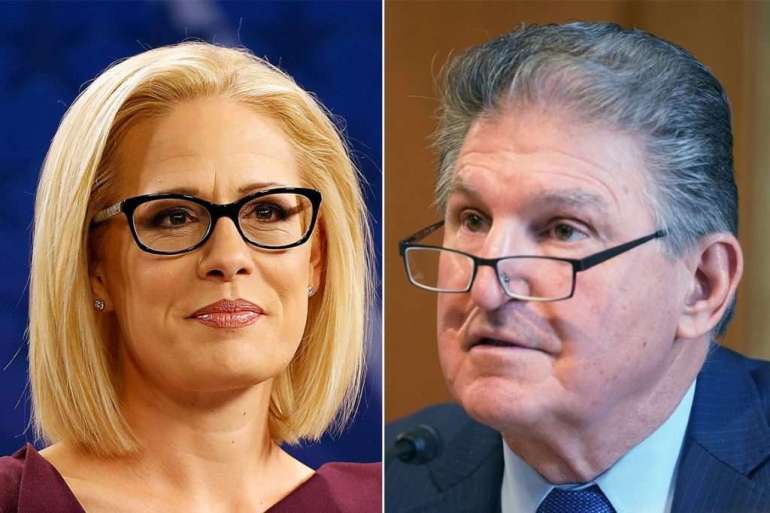Mitch McConnell wants his conference to say nice things about these 2 Democrats

“What they’ve been very forthright about is protecting the institution against pressures from their own party. I know what that’s like,” McConnell said, referring to former President Donald Trump’s demands that he kill the filibuster. “Every time I said no. And it’s nice that there are Democrats left who respect the institution and don’t want to destroy the very essence of the Senate.”
It’s a surprising turn for McConnell and his party, who tried unsuccessfully to defeat both centrist politicians in the 2018 election and only occasionally tried to woo the pair while they held the majority. But in a 50-50 Senate where Democrats are eager to sidestep Republicans, Sinema and Manchin are the GOP’s most important allies under the dome. The more that duo resists liberal entreaties to gut the filibuster and fall in line, the more reassured Republicans are that the upper chamber can remain a check on their party’s most left-leaning impulses while Democrats control Washington.
McConnell’s top lieutenant, John Thune of South Dakota, chats up both Democrats frequently on the floor and sometimes hangs out with them outside the Senate. He spoke of Manchin and Sinema in almost reverential terms on Wednesday.
“For me right now, they’re almost guardians of democracy because they’re trying to protect us from the loss of the legislative filibuster and everything that would come with that. They’re good people,” Thune said in an interview. “They want to do the right thing.”
Manchin didn’t quite return the compliments when asked about Republicans’ praise. Sure, he’s sincere about working with them, but at some point he hopes the GOP budges a bit on its unrelenting criticism of President Joe Biden’s domestic agenda.
“I just hope they help me a little bit in bipartisanship,” Manchin said of Republicans. “That’s all.”
Though moderation and deep relationships with the GOP unite them, Sinema and Manchin have yin-and-yang personalities. Sinema zips into votes quietly and rarely utters a word to the plethora of media stationed around the Capitol. Manchin is a gregarious backslapper who revels in a hallway gaggle or Sunday show appearance, an old-school retail politician who can’t resist jumping into a bipartisan gang to try to make a deal.
And the two are dominating the otherwise barren fields of bipartisanship in today’s Senate. Republicans are under the impression that both are sincere about pursuing a bipartisan infrastructure deal, not another party-line proposal.
Sinema is talking to Sen. Shelley Moore Capito (R-W.Va.) about infrastructure, working with Sen. Mitt Romney (R-Utah) on minimum wage legislation and trying to write a bill addressing the migration surge at the border with Sen. John Cornyn (R-Texas). A spokesman for Sinema said she “believes the best way to achieve lasting results for Arizona is through bipartisan negotiations.”
And Manchin is the only Democrat not supporting the massive voting rights measure passed by the House, trying to force a bipartisan negotiation on infrastructure and digging in against the White House’s initial offer on corporate tax hikes. He said he believes Republicans aren’t all talk and no give, that “they really want to work.”
But what makes Manchin and Sinema particularly valuable to Republicans is their defense of the filibuster, which gives the GOP’s 50-vote minority significant sway over the agenda. Both have recently dug into their defense of the 60-vote requirement to pass most bills, an indication that Democrats may simply lack the votes to squash the minority party’s legislative power during this Congress.
Cornyn compared Sinema to former Sen. Lamar Alexander (R-Tenn.), beloved in his party, after she urged senators to change their habits instead of messing with the Senate rules. “I thought that was a pretty profound statement on her part,” the Texan said.
“They’ve both taken strong stands against the filibuster, and [Republicans are] very much committed to that,” said Capito, Manchin’s junior senator and friendly with Sinema since their days in the House.
Manchin and Sinema’s frequent defense of the filibuster, Capito added, helps “reinforce how valuable that is to the institution but also, obviously, to us as Republicans.”
Romney said he speaks to both of them “every day,” describing the two prominent filibuster backers as proxies for a larger group of Democrats who more quietly voice their own concerns about killing the 60-vote threshold.
“There are a number of Democrats that are appreciative of the fact that Manchin and Sinema are standing tall [and] taking the slings and arrows,” Romney said.
What’s more, Republicans acknowledge the duo are the Hill’s most effective advocates for moderation as Democrats eye a go-it-alone approach on huge spending bills. When they can’t drive compromise directly through legislation that’s passed through budget reconciliation, GOP senators can influence the process by keeping close ties to Sinema and Manchin.
Notably, Manchin’s personal relationship with Sen. Rob Portman (R-Ohio) ended up forcing Democrats into a last-minute paring back of unemployment benefits during debate on Biden’s $1.9 trillion coronavirus aid bill. No Republicans supported that legislation, but they were able to make their mark through Manchin.
If Democrats do pursue infrastructure legislation along party lines, Republicans will once again look to their two buddies across the aisle to exert a centrist pull — whether or not progressives howl in protest.
Manchin and Sinema’s influence has “been very helpful,” said Sen. John Kennedy (R-La.). “Now, I don’t want to overstate that. I don’t think either one of them have fundamentally changed the direction of important Democratic legislation just yet. But they’ve certainly slowed down a lot of the more radical ideas.”